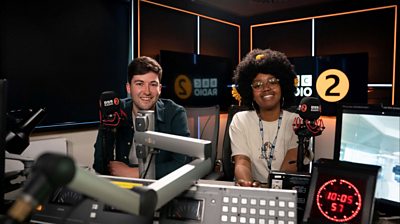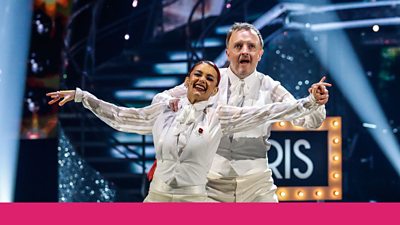Image: Two ÃÛÑ¿´«Ã½ staff members in the ÃÛÑ¿´«Ã½ Radio 2 studio
Workforce Ambitions
First and foremost, we aim to attract, employ and retain the best possible talent into the ÃÛÑ¿´«Ã½ whatever their background.
Whilst our ambition to build inclusion and belonging applies to the whole ÃÛÑ¿´«Ã½, including internationally, in the UK we are also guided by our ambitious workforce diversity goals, to help us develop a ÃÛÑ¿´«Ã½ that reflects the shape and make-up of the UK and the audiences we serve. The right representation within the ÃÛÑ¿´«Ã½, helps us ensure the right representation and portrayal in our content.
Our goals serve as a guide, designed to help ensure we recruit from the widest possible talent pool showcasing that the ÃÛÑ¿´«Ã½ is for everyone, including those who may not currently see it as a place for them. We are striving to eliminate barriers so that everyone has the opportunity to join and thrive at the ÃÛÑ¿´«Ã½.
In 2021 we committed to be a modern 50:20:12 organisation, that's 50% women and 50% men, 20% from a Black, Asian or minority ethnic background, and 12% disabled staff, by March 2026.
In 2022 we said 25% staff will come from working class backgrounds by 2027.
Our last audited figures from the Annual Report and Accounts 2024 show our workforce is made up of:
- 50.1% women
- 49% women leaders
- 17% Black, Asian and minority ethnic staff
- 14.4% Black, Asian and minority ethnic leaders
- 9.4% disabled staff
- 7.9% disabled leaders
- 21.1% working-class staff
- 19.3% working-class leaders.
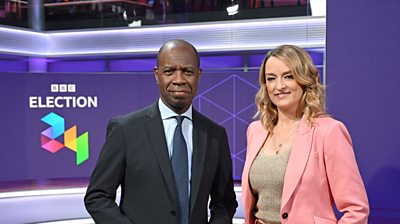
Building on our progress
We are proud of the progress that has been made, but we know we have more to do to ensure we truly represent the audiences we serve, particularly in the areas of ethnicity and disability.
We also know that the labels we’re using to set these workforce goals may not represent the way in which everyone chooses to describe themselves. These groupings are important to hold ourselves to account, report on our progress and ensure we’re focused on dismantling the barriers that are experienced by people from different backgrounds. We're also looking at how we represent and reflect our audiences more widely, for example, ensuring our LGBTQ+ staff, faith groups and people of different ages feel a sense of belonging at the ÃÛÑ¿´«Ã½.
It is right that we always review our plans and as part of this next phase of our strategy we will align our plans to the new Charter period, aiming to meet all our goals by 2027.
Additionally, to align with industry best practice and to give more visibility to our neurodivergent staff, from 2025/26 we will measure the percentage of colleagues who are disabled, as well as those who are deaf and/or neurodivergent. This means our 12% disability target will be replaced by a new goal of 14% that measures the combined total of deaf, disabled and/or neurodivergent staff. We have enhanced the ÃÛÑ¿´«Ã½ Extend programme to help us achieve this level of representation.
In line with the Equality Act 2010, Extend provides ring-fenced roles for disabled people which can include those who identify as deaf and/or neurodivergent.
In addition, we are reviewing and improving processes to enable all colleagues to receive necessary adjustments as soon as possible.
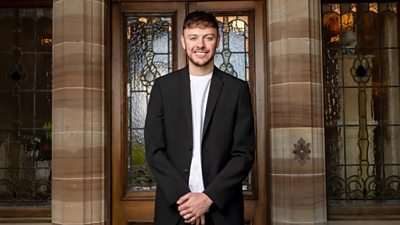
Delivering on our strategy: Our Workforce
Some of our key focus areas across the life of this strategy include:
Reflecting our audiences in our workforce by:
- enabling more inclusive recruitment and onboarding practices to ensure we attract the widest possible pool of diverse talent
- continuing our focus to recruit Early Careers Apprentices from diverse backgrounds across the United Kingdom through our award winning programme
- enhancing our development and progression offering by expanding the impact of our career development initiatives including 80/20 and Hot Shoes
- reaffirming our commitment to ÃÛÑ¿´«Ã½ Extend, our flagship programme to ring-fence roles in line with the Equality Act 2010 for disabled people, which can include those who identify as deaf and/or neurodivergent
- building on the success of RISE and Elev8 – our mentoring and development programmes to progress talent from Black, Asian and minority ethnic backgrounds and deaf, disabled and/or neurodivergent staff.
Creating inclusive and accessible working environments, by:
- the rollout of Inclusive Leadership training for managers and new training for staff to ensure diversity is appreciated, and everyone is encouraged and supported to participate fully
- reviewing and updating our policies and procedures to ensure they promote inclusion and provide the right support
- ensuring inclusive accessible designs, cultures and communications, with enhanced workplace support and a streamlined process for obtaining adjustments, including assistive technology (with appropriate training) for our deaf, disabled and/or neurodivergent staff
- putting accessibility at the heart of our digital transformation and a foundational element of the user experience and product lifecycle
Seeking insights from our colleagues to improve the way we work, by:
- enhancing the effectiveness of Staff Networks by offering new resources and structures, with the support of the Executive Sponsors and HR Directors
- continually improving our staff experience, by developing better insights on the barriers and enablers to inclusion for our staff
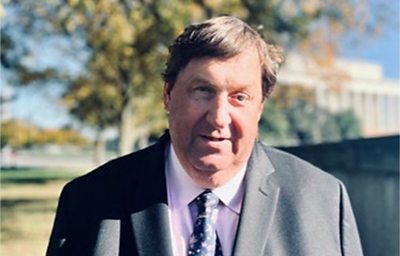
Delivering on our strategy: Our Staff Networks and Community Groups
Our staff networks sit at the heart of building a sense of belonging at the ÃÛÑ¿´«Ã½.
We are immensely proud of our nine thriving staff networks, which collectively, now have over 11,000 members. They play a vital role in building mutual understanding, collaboration and celebration of our unique communities across the organisation.
Our networks reflect the needs of staff, respond to societal changes and help us understand how we can help everyone realise their potential and feel supported here. Most recently, we have introduced the Enigma network for neurodivergent staff, and, as part of ÃÛÑ¿´«Ã½ Embrace, our multicultural network, we have added the Jewish Staff Network and ÃÛÑ¿´«Ã½ Salaam for Muslim staff.
We also have some informal networks such as our Carers network, Stammering network and other community groups including hubs across the United Kingdom and in ÃÛÑ¿´«Ã½ Studios.

Staff network activities
Over the course of the year, our networks host events and listening sessions for their members.
Recent events have included our socio-economic diversity network ÃÛÑ¿´«Ã½ RAISED's panel discussion 'Is Class Still a Thing?'; to celebrate International Women's Day a 'How Your Identity Is Your Superpower' session was delivered by our three women's networks; ÃÛÑ¿´«Ã½ Ability, our disabled staff network, held their Rethink Disability Festival to mark International Day of Disabled People; and the Young Talent Network held a cross-industry event with Sky, NBC Universal and Warner Bros Discovery to support networking and discuss issues pertinent to young people within the media industry.
Supporting our staff networks
Each of the nine formal networks are supported by a senior HR representative and an Executive Sponsor, as well as clear governance and resources to support their growth and impact.
The co-chairs of our central staff networks now benefit from specialised training and have 20% of their working time protected for their staff network activity. And many staff network board members have benefited from their experiences and have gone on to work in more stretching roles.
